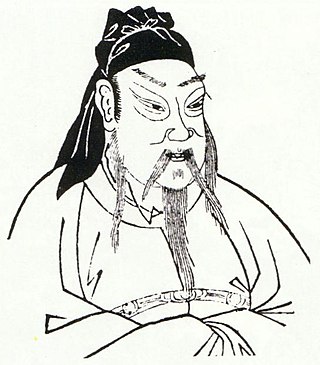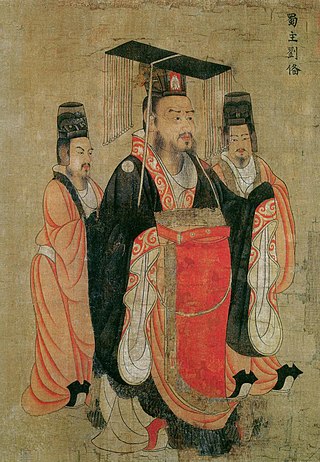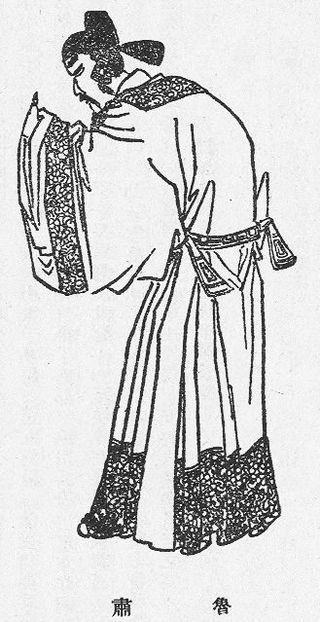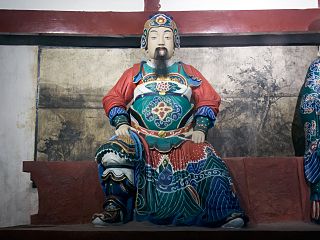Related Research Articles

Guan Yu, courtesy name Yunchang, was a Chinese military general serving under the warlord Liu Bei during the late Eastern Han dynasty of China. Along with Zhang Fei, he shared a brotherly relationship with Liu Bei and accompanied him on most of his early exploits. Guan Yu played a significant role in the events leading up to the end of the Han dynasty and the establishment of Liu Bei's state of Shu Han during the Three Kingdoms period. While he is remembered for his loyalty towards Liu Bei, he is also known for repaying Cao Cao's kindness by slaying Yan Liang, a general under Cao Cao's rival Yuan Shao, at the Battle of Boma. After Liu Bei gained control of Yi Province in 214, Guan Yu remained in Jing Province to govern and defend the area for about seven years. In 219, while he was away fighting Cao Cao's forces at the Battle of Fancheng, Liu Bei's ally Sun Quan broke the Sun–Liu alliance and sent his general Lü Meng to conquer Liu Bei's territories in Jing Province. By the time Guan Yu found out about the loss of Jing Province after his defeat at Fancheng, it was too late. He was subsequently captured in an ambush by Sun Quan's forces and executed.

The Battle of Xiaoting (猇亭之戰), also known as the Battle of Yiling and the Battle of Yiling and Xiaoting, was fought between the state of Shu and the state of Wu, between the years 221 and 222 in the early Three Kingdoms period of China. The battle is significant because Wu was able to turn the situation from a series of initial losses into a defensive stalemate, before proceeding to win a decisive victory over Shu. The Wu victory halted the Shu invasion and preceded the death of Liu Bei, Shu's founding emperor.

Liu Bei, courtesy name Xuande (玄德), was a Chinese warlord in the late Eastern Han dynasty who later became the founding emperor of Shu Han, one of the Three Kingdoms of China. Although he was a distant relative of the Han imperial family, Liu Bei's father died when he was a child and left his family impoverished. To help his mother, he sold shoes and straw mats. When he reached the age of fifteen, his mother sent him to study under Lu Zhi. In his youth, Liu Bei was known as ambitious and charismatic. He gathered a militia army to fight the Yellow Turbans. Liu Bei fought bravely in many battles and grew famous for his exploits. Later, he participated in the coalition against Dong Zhuo, following this joined his childhood friend Gongsun Zan and fought under him against Yuan Shao.

Zhang Fei, courtesy name Yide, was a Chinese military general and politician serving under the warlord Liu Bei in the late Eastern Han dynasty and early Three Kingdoms period of China. Zhang Fei and Guan Yu, who were among the earliest to join Liu Bei, shared a brotherly relationship with their lord and accompanied him on most of his early exploits. Zhang Fei fought in various battles on Liu Bei's side, including the Red Cliffs campaign (208–209), takeover of Yi Province (212–214), and Hanzhong Campaign (217–218). He was assassinated by his subordinates in 221 after serving for only a few months in the state of Shu Han, which was founded by Liu Bei earlier that year.

Zhang Zhao (156–236), courtesy name Zibu, was a Chinese calligrapher, essayist, military general, and politician. He served as an official of the state of Eastern Wu during the Three Kingdoms period of China. Born in the late Eastern Han dynasty, Zhang Zhao started his career as a scholar in his native Xu Province before the chaos towards the end of the Eastern Han dynasty forced him to flee south to the Jiangdong region for shelter. In Jiangdong, Zhang Zhao became an adviser to the rising warlord Sun Ce. After Sun Ce's death in the year 200, Zhang Zhao played a key supporting role to Sun Ce's younger brother and successor, Sun Quan, as he consolidated power and his control over the Jiangdong territories. In 208, Zhang Zhao strongly urged Sun Quan to surrender to Cao Cao, a rival warlord, because he believed that they stood no chance against an impending invasion by Cao Cao. However, Sun Quan refused to listen to Zhang Zhao and instead heeded the advice of Lu Su and Zhou Yu. Sun Quan's forces ultimately scored a decisive victory over Cao Cao at the Battle of Red Cliffs in the winter of 208. From 200 until his death in 236, Zhang Zhao served under Sun Quan through the collapse of the Eastern Han dynasty and into the Three Kingdoms period after Sun Quan became the founding emperor of the Eastern Wu state. Throughout his career, Zhang Zhao was known for being a stern, uncompromising and intimidating figure who commanded respect from both his colleagues and Sun Quan. Despite Zhang Zhao's seniority and experience, Sun Quan passed him over twice as a candidate for the position of Imperial Chancellor in 222 and 225 as he believed that Zhang Zhao was so headstrong and stubborn that he would not be able to effectively lead the administration. Nevertheless, Sun Quan paid his due respects to Zhang Zhao as a mentor-like figure who saw him through his formative years to his accession to the throne.

Lu Su (172–217), courtesy name Zijing, was a Chinese military general and politician serving under the warlord Sun Quan during the late Eastern Han dynasty. In the year 200, when Sun Quan had just taken over the reins of power, his adviser Zhou Yu recommended Lu Su as a talent to Sun Quan. As one of Sun Quan's most important advisers in the warlord's early career, Lu Su is best known for making some significant contributions. Firstly, in 200 he drafted a long-term strategy for Sun Quan's power bloc to emerge as one of three major contending powers in China – a plan similar to Zhuge Liang's Longzhong Plan, which was proposed about seven years later. Secondly, before the Battle of Red Cliffs in late 208, he was the first person to persuade Sun Quan to ally with Liu Bei against Cao Cao. Thirdly, he succeeded Zhou Yu as the frontline commander of Sun Quan's forces in 210 after Zhou's death and maintained the Sun–Liu alliance. Fourthly, in 215, he represented Sun Quan at the negotiations with Liu Bei's general Guan Yu during the Sun–Liu territorial dispute over Jing Province.
Lady Wu, personal name unknown, was a Chinese noble lady, aristocrat and posthumously honoured as Empress of Eastern Wu state. She was the wife of the warlord Sun Jian, who lived during the late Eastern Han dynasty of China. She bore Sun Jian four sons and a daughter – Sun Ce, Sun Quan, Sun Yi, Sun Kuang and Lady Sun. She was posthumously honoured as Empress Wulie in 229 by her second son Sun Quan, who became the founding emperor of the state of Eastern Wu in the Three Kingdoms period.
Sun He, courtesy name Zixiao, was an imperial prince of the state of Eastern Wu during the Three Kingdoms period of China. He was the third son of Sun Quan, the founding emperor of Wu. In 242, he became the crown prince after the death of his brother Sun Deng, the eldest son and first heir apparent of Sun Quan. In the 240s, a power struggle broke out between Sun He and his fourth brother, Sun Ba, over the succession to their father's throne. The conflict ended in 250 when Sun Quan forced Sun Ba to commit suicide, deposed Sun He and replaced him with Sun Liang. In 253, during Sun Liang's reign, the regent Sun Jun reduced Sun He to commoner status and forced him to commit suicide. In 264, one of Sun He's sons, Sun Hao, became the fourth emperor of Eastern Wu. After his coronation, Sun Hao honoured his father with the posthumous title Emperor Wen.
Huang Quan, courtesy name Gongheng, was a Chinese military general and politician of the state of Cao Wei during the Three Kingdoms period of China. He previously served under the warlords Liu Zhang and Liu Bei during the late Eastern Han dynasty and in the state of Shu Han during the early Three Kingdoms period before defecting to Cao Wei. Liu Bei relied heavily on Huang Quan for counsel in both domestic and foreign policy. Under the Wei government, however, Huang Quan was restricted to only internal affairs because even though the Wei emperor Cao Pi appreciated him for his talent, he doubted Huang Quan's allegiance and believed he was still secretly loyal to Liu Bei.
Luo Tong (193–228), courtesy name Gongxu, was an official serving under the warlord Sun Quan during the late Eastern Han dynasty and early Three Kingdoms period of China.
Yan Jun, courtesy name Mancai, was an official of the state of Eastern Wu during the Three Kingdoms period of China.

Deng Zhi, courtesy name Bomiao, was a government official, diplomat and military general of the state of Shu Han during the Three Kingdoms period of China. A descendant of Deng Yu, Deng Zhi started his career in the late Eastern Han dynasty under the warlord Liu Bei as a low-level officer in Pi County. After Liu Bei discovered his talent, Deng Zhi steadily rose through the ranks to become a county prefect and later a commandery administrator and imperial secretary. In 223, the Shu regent Zhuge Liang sent him as Shu's envoy to meet Sun Quan, the ruler of Shu's ally state Wu, and reestablish the Wu–Shu alliance against their common rival state Wei. Deng Zhi succeeded in his mission and earned praise from Sun Quan for strengthening Wu–Shu ties. In 227, Deng Zhi became a military general and he participated in the first Shu invasion of Wei by leading a decoy force with Zhao Yun to distract the Wei general Cao Zhen. Although they lost the battle, Deng Zhi and Zhao Yun managed to rally their troops to put up a firm defence during their retreat and minimise their losses. Following Zhuge Liang's death in 234, Deng Zhi rose to higher general ranks and was stationed in present-day Chongqing for about 10 years before he was recalled back to the Shu capital Chengdu in his 70s to serve as General of Chariots and Cavalry. In 248, he suppressed a rebellion in Fuling. He died in 251.
Gu Yong, courtesy name Yuantan, was a Chinese calligrapher, musician, and politician. He served as a minister and the second Imperial Chancellor of the state of Eastern Wu during the Three Kingdoms period of China. Born in the late Eastern Han dynasty in the Jiangdong region, Gu Yong studied under the tutelage of Cai Yong in his early years and earned high praise from his mentor. He started his career as a county chief and served in various counties throughout Jiangdong. Around the year 200, he came to serve the warlord Sun Quan, who controlled the Jiangdong territories, and performed well in office as an acting commandery administrator. After Sun Quan became the ruler of the independent state of Eastern Wu in 222, Gu Yong steadily rose through the ranks as a minister and ultimately became Imperial Chancellor. He held office for about 19 years from 225 until his death in 243.
Gu Tan, courtesy name Zimo, was an official of the state of Eastern Wu during the Three Kingdoms period of China.
Zhu Ju (194–250), courtesy name Zifan, was a Chinese military general and politician of the state of Eastern Wu during the Three Kingdoms period of China. A son-in-law of Wu's founding emperor Sun Quan, Zhu Ju served briefly as the fifth Imperial Chancellor of Wu from 249 to 250.
Bu Zhi, courtesy name Zishan, was a Chinese military general and politician of the state of Eastern Wu during the Three Kingdoms period of China. Originally a scholar of humble background, he became a subordinate of the warlord Sun Quan in the late Eastern Han dynasty and gradually rose through the ranks. Between 210 and 220, he served as the governor of the remote and restive Jiao Province in southern China. During the Battle of Xiaoting/Yiling of 221–222, he quelled local uprisings in Sun Quan's territories in southern Jing Province and maintained peace in the area. After Sun Quan became emperor in 229, Bu Zhi oversaw the Wu armed forces guarding the Wu–Shu border at Xiling for about 20 years. During this time, he also gave advice to Sun Quan's first heir apparent, Sun Deng, and spoke up for officials affected by Lü Yi's abuses of power. In 246, he became the fourth Imperial Chancellor of Wu, but died in office in the following year.
Liu Bei's takeover of Yi Province was a military campaign by the warlord Liu Bei in taking control of Yi Province from the provincial governor, Liu Zhang. The campaign took place between the years 211 and 214 in the late Eastern Han dynasty; although the conflict between Liu Bei and Liu Zhang started in January or February 213 when the latter discovered the former secret communications and subsequently executed Zhang Song. It concluded with victory for Liu Bei and his successful takeover of the province from Liu Zhang in July 214. Yi Province would serve as the foundation of the state of Shu Han during the Three Kingdoms period.
Yin Li, courtesy name Desi, was an official of the state of Eastern Wu in the Three Kingdoms period of China.

Lu Ji (188–219), courtesy name Gongji, was a Chinese politician and scholar serving under the warlord Sun Quan in the late Eastern Han dynasty of China. He was also one of the 24 Filial Exemplars.
Ji Yan, courtesy name Zixiu, was a Chinese politician of the state of Eastern Wu during the Three Kingdoms period of China. An impulsive and impetuous man, he thought highly of himself and liked to assume the moral high ground to criticise and disparage others. While serving in the selection bureau, he came up with radical ideas to reform the bureaucracy by demoting or dismissing officials based on assessments of their moral character. His ideas proved to be highly unpopular as he incurred much resentment from his colleagues, who accused him of being unprofessional and biased. When his colleagues Lu Xun, Lu Mao and Zhu Ju advised him to change his offensive behaviour, he ignored their well-meaning advice. In 224, he committed suicide after he was removed from office on allegations of unprofessional conduct.
References
- 1 2 ([黄武]三年夏,遣輔義中郎將張溫聘于蜀。) Sanguozhi vol. 47.
- 1 2 (時年三十二,以輔義中郎將使蜀。權謂溫曰:「卿不宜遠出,恐諸葛孔明不知吾所以與曹氏通意,以故屈卿行。若山越都除,便欲大搆於蜀。行人之義,受命不受辭也。」溫對曰:「臣入無腹心之規,出無專對之用,懼無張老延譽之功,又無子產陳事之效。然諸葛亮達見計數,必知神慮屈申之宜,加受朝廷天覆之惠,推亮之心,必無疑貳。」) Sanguozhi vol. 57.
- 1 2 de Crespigny (2007), p. 1078.
- 1 2 ([黃武三年]秋八月,赦死罪。) Sanguozhi vol. 47. The month corresponds to 1 to 29 Sep 224 in the Julian calendar.
- 1 2 (後六年,溫病卒。) Sanguozhi vol. 57.
- ↑ (張溫字惠恕,吳郡吳人也。父允,以輕財重士,名顯州郡,為孫權東曹掾,卒。) Sanguozhi vol. 57.
- ↑ (溫少脩節操,容貌奇偉。權聞之,以問公卿曰:「溫當今與誰為比?」大司農劉基曰:「可與全琮為輩。」太常顧雍曰:「基未詳其為人也。溫當今無輩。」權曰:「如是,張允不死也。」徵到延見,文辭占對,觀者傾竦,權改容加禮。罷出,張昭執其手曰:「老夫託意,君宜明之。」拜議郎、選曹尚書,徙太子太傅,甚見信重。) Sanguozhi vol. 57.
- ↑ (溫至蜀,詣闕拜章曰:「昔高宗以諒闇昌殷祚於再興,成王以幼沖隆周德於太平,功冒溥天,聲貫罔極。今陛下以聦明之姿,等契往古,總百揆於良佐,參列精之炳燿,遐邇望風,莫不欣賴。吳國勤任旅力,清澄江滸,願與有道平一宇內,委心協規,有如河水,軍事興煩,使役乏少,是以忍鄙倍之羞,使下臣溫通致情好。陛下敦崇禮義,未便恥忽。臣自入遠境,及即近郊,頻蒙勞來,恩詔輒加,以榮自懼,悚怛若驚。謹奉所齎函書一封。」蜀甚貴其才。) Sanguozhi vol. 57.
- ↑ (還,頃之,使入豫章部伍出兵,事業未究。) Sanguozhi vol. 57.
- ↑ (權旣陰銜溫稱美蜀政,又嫌其聲名大盛,衆庶炫惑,恐終不為己用,思有以中傷之,會曁豔事起,遂因此發舉。豔字子休,亦吳郡人也,溫引致之,以為選曹郎,至尚書。豔性狷厲,好為清議,見時郎署混濁淆雜,多非其人,欲臧否區別,賢愚異貫。彈射百僚,覈選三署,率皆貶高就下,降損數等,其守故者十未能一,其居位貪鄙,志節汙卑者,皆以為軍吏,置營府以處之。而怨憤之聲積,浸潤之譖行矣。) Sanguozhi vol. 57.
- ↑ (競言豔及選曹郎徐彪,專用私情,愛憎不由公理,豔、彪皆坐自殺。溫宿與豔、彪同意,數交書疏,聞問往還,即罪溫。) Sanguozhi vol. 57.
- ↑ (權幽之有司,下令曰:「昔令召張溫,虛己待之,旣至顯授,有過舊臣,何圖凶醜,專挾異心。昔曁豔父兄,附于惡逆,寡人無忌,故進而任之,欲觀豔何如。察其中間,形態果見。而溫與之結連死生,豔所進退,皆溫所為頭角,更相表裏,共為腹背,非溫之黨,即就疵瑕,為之生論。又前任溫董督三郡,指撝吏客及殘餘兵,時恐有事,欲令速歸,故授棨戟,獎以威柄。乃便到豫章,表討宿惡,寡人信受其言,特以繞帳、帳下、解煩兵五千人付之。後聞曹丕自出淮、泗,故豫勑溫有急便出,而溫悉內諸將,布於深山,被命不至。賴丕自退,不然,已往豈可深計。又殷禮者,本占候召,而溫先後乞將到蜀,扇揚異國,為之譚論。又禮之還,當親本職,而令守尚書戶曹郎,如此署置,在溫而已。又溫語賈原,當薦卿作御史,語蔣康,當用卿代賈原,專衒賈國恩,為己形勢。揆其姧心,無所不為。不忍暴於巿朝,今斥還本郡,以給厮吏。嗚呼溫也,免罪為幸!」) Sanguozhi vol. 57.
- ↑ (將軍駱統表理溫曰:「 ... 」權終不納。) Sanguozhi vol. 57.
- ↑ (二弟祗、白,亦有才名,與溫俱廢。) Sanguozhi vol. 57.
- ↑ (績於鬱林所生女,名曰鬱生,適張溫弟白。) Annotation in Sanguozhi vol. 57.
- ↑ "Exemplary Acts of Filial Piety and Noble Mothers": On his deathbed, Zhang Bai entrusted household matters to his sister-in-law, Lü Yusheng.
- ↑ (文士傳曰:溫姊妹三人皆有節行,為溫事,已嫁者皆見錄奪。其中妹先適顧承,官以許嫁丁氏,成婚有日,遂飲藥而死。吳朝嘉歎,鄉人圖畫,為之贊頌云。) Wenshi Zhuan annotation in Sanguozhi vol. 57.
- ↑ (會稽典錄曰:餘姚虞俊歎曰:「張惠恕才多智少,華而不實,怨之所聚,有覆家之禍,吾見其兆矣。」諸葛亮聞俊憂溫,意未之信,及溫放黜,亮乃歎俊之有先見。亮初聞溫敗,未知其故,思之數日,曰:「吾已得之矣,其人於清濁太明,善惡太分。」) Kuaiji Dianlu annotation in Sanguozhi vol. 57.
- ↑ (評曰: ... 張溫才藻俊茂,而智防未備,用致艱患。) Sanguozhi vol. 57.
- ↑ (臣松之以為莊周云「名者公器也,不可以多取」,張溫之廢,豈其取名之多乎!多之為弊,古賢旣知之矣。是以遠見之士,退藏於密,不使名浮於德,不以華傷其實,旣不能被褐韞寶,杜廉逃譽,使才映一世,聲蓋人上,沖用之道,庸可暫替!溫則反之,能無敗乎?權旣疾溫名盛,而駱統方驟言其美,至云「卓躒冠羣,煒曄曜世,世人未有及之者也」。斯何異燎之方盛,又撝膏以熾之哉!) Pei Songzhi's annotation in Sanguozhi vol. 57.
- Chen, Shou (3rd century). Records of the Three Kingdoms (Sanguozhi).
- de Crespigny, Rafe (2007). A Biographical Dictionary of Later Han to the Three Kingdoms (23–220 AD). Leiden: Brill. ISBN 9789004156050.
- Luo, Guanzhong (14th century). Romance of the Three Kingdoms (Sanguo Yanyi).
- Pei, Songzhi (5th century). Annotations to Records of the Three Kingdoms (Sanguozhi zhu).